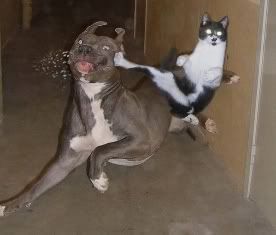 |
| photobucket.com |
If you’re bringing home an older
puppy or more mature dog, both the resident dog and newcomer are likely to have
“issues.” In order to understand what the canines are going through, compare it
to what it can feel like to both children when a foster child joins a
preexisting family. There are often rough patches in which everyone involved
feels awkward and unsure of where they fit in the new picture. Insecure about
their place in the family hierarchy, they can have a bumpy ride until things
get sorted out. Since the animals will be looking to you for leadership, it
will make the transition smoother if you are clear about how to handle the
issues that arise between the dogs.
To make the transition smoother, it
helps to maintain a realistic expectation of how your existing pets will react
to the newcomer. If you know what to expect, you won’t be alarmed or
discouraged. Don’t worry that you’ve made a terrible mistake in bringing home a
dog, or that the mistake is the one you chose to bring. Avoid feeling annoyed or
disappointed in either animal.
Reactions to the New Dog
• Jealous
• Threatened
• Offensive/aggressive
• Frightened/intimidated
• Withdrawn/depressed
• Possessive of you
• Territorial about bed/toys
• Suspicious/ anxious•
Urinating/defecating in house
• General disobedience/ ignoring
commands
If you anticipate some of these
normal adjustment reactions, and understand that they are generally
short-lived, then the transition will be less stressful for you. It can be
frustrating to feel so happy and excited about bringing home the new bundle of
joy, only to be met by growls and hisses from the resident pet(s). But what can
you do? You can accept your resident dog’s behavior without judgment, because
the crabby attitude will pass. As a friend likes to say in defense of her dogs:
“Hey, they’re only human.”
Copyright © Tracie Hotchner – Originally appeared in The Dog Bible: Everything Your Dog Wants You to Know by Tracie Hotchner
Copyright © Tracie Hotchner – Originally appeared in The Dog Bible: Everything Your Dog Wants You to Know by Tracie Hotchner
No comments:
Post a Comment